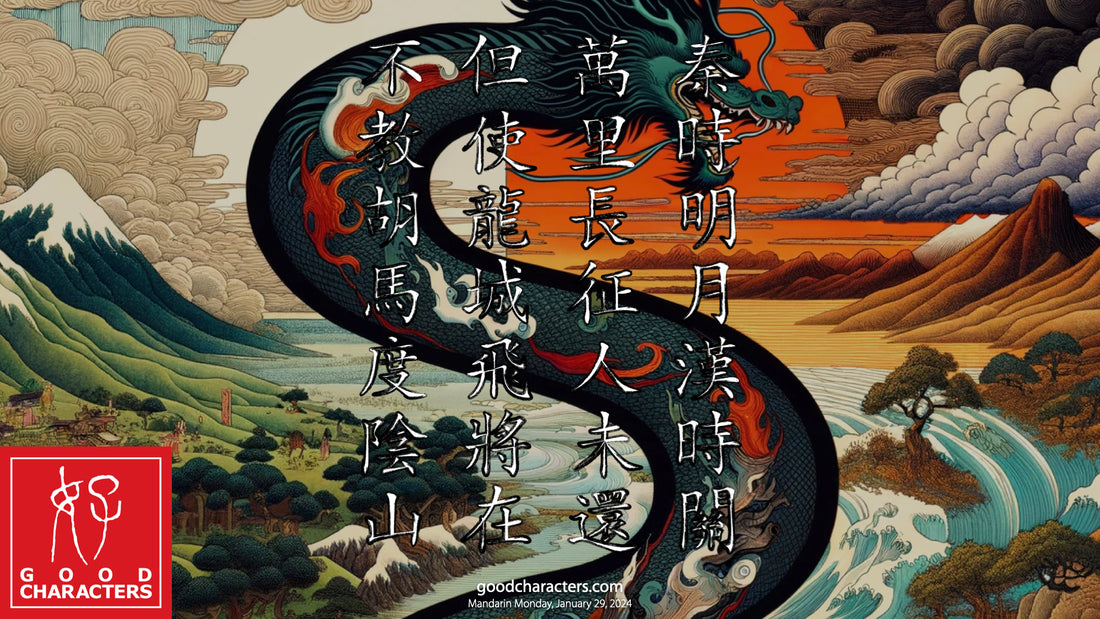This week, in line with the theme of the Year of the Dragon, I want to share a poem with you that was written over 1,200 years ago and includes the name “Dragon Fortress” in it.
What is your “Dragon Fortress"? Are you like a “Flying General”?
In branding, various strategies exist to build a “Dragon Fortress” to protect your trademarks. However, having a protective wall is not enough to keep competitors away from the market; one also needs strong names, just like a strong “Flying General,” to ensure victory.
Mandarin Monday, January 29, 2024 Newsletter
=====
Out to the Frontier
=====
Here is a translation of “Out to the Frontier” (出塞), a poem written by Wang Changling (王昌齡), a poet from the Tang Dynasty (唐), over 1,200 years ago.
The bright moon of the Qin and Han eras, the passes of the Qin and Han times.
Ten thousand miles of military campaigns, yet the people have not returned.
If only the Flying General of the Dragon Fortress were here,
He would not have allowed the barbarian horses to cross the Yin Mountains.
秦時明月漢時關,
萬里長征人未還。
但使龍城飛將在,
不教胡馬度陰山。
This renowned frontier fortress poem expresses the wish for peace and security along the borders, a desire that had not been realized for almost a thousand years at the time the poem was written.
1st line:
The bright moon of the Qin and Han eras, the passes of the Qin and Han times.
秦 (Qin) 時 (time) 明 (bright) 月 (moon) 漢 (Han) 時 (time) 關 (pass)
The first line depicts a desolate scene with moonlight shining over the border, referencing the Qin and Han dynasties to emphasize that warfare in this area has never ceased since that time, thus highlighting the passage of time.
2nd line:
Ten thousand miles of military campaigns, yet the people have not returned.
萬 (ten thousand) 里 (miles) 長 (long) 征 (expedition) 人 (people) 未 (not yet) 還 (return).
The next line highlights the immense distance between the frontier and the interior, while also capturing the tragedy of war, particularly the poignant fact that those who left for battle have not yet returned.
3rd line:
If only the Flying General of the Dragon Fortress were here, . . .
但 (but) 使 (if) 龍 (dragon) 城 (fortress) 飛 (flying) 將 (general) 在 (present),
Various theories surround the identities of the Dragon Fortress and the Flying General in this line. These could also symbolize the Great Wall of China winding across mountain tops like a dragon, with valiant and skilled generals advancing swiftly, as if in flight, to secure victory.
4th line:
He would not have allowed the barbarian horses to cross the Yin Mountains.
不 (not) 教 (allow) 胡馬 (barbarian horses) 度 (cross) 陰山 (Yin Mountains).
The poem’s final line guides readers to inevitable conclusions of sorrow and indignation. It laments the inability to prevent the entry of foreign invaders’ cavalry and the resulting endless wars, attributing them to a lack of brave and adept leadership.
To truly appreciate the beauty of this poem, you’ll need a deep understanding of the characters. Nevertheless, I hope you also enjoy this literal, word-for-word translation of the poem for your reference:
秦 (Qin) 時 (time) 明 (bright) 月 (moon) 漢 (Han) 時 (time) 關 (pass),
萬 (ten thousand) 里 (miles) 長 (long) 征 (expedition) 人 (people) 未 (not yet) 還 (return).
但 (but) 使 (if) 龍 (dragon) 城 (fortress) 飛 (flying) 將 (general) 在 (present),
不 (not) 教 (allow) 胡馬 (barbarian horses) 度 (cross) 陰山 (Yin Mountains).
Life is filled with both small and large challenges. For most people, problems never cease. It’s up to us to find ways to solve these challenges by keeping our minds strong, thinking clearly, and learning to adapt quickly.

